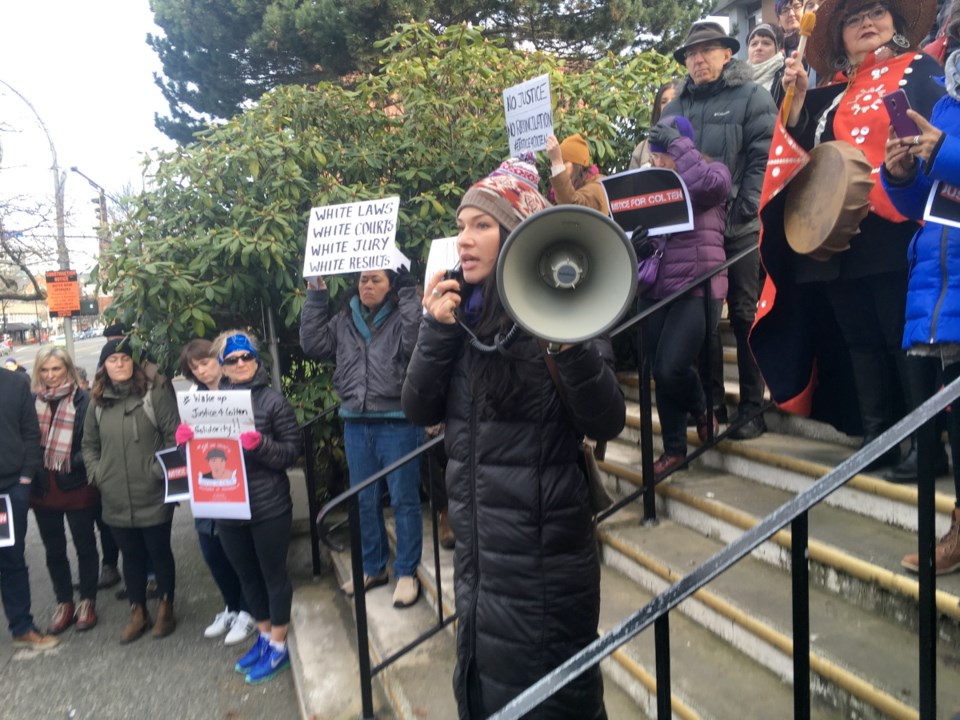The outcry from Aboriginal groups and others after a jury acquitted a Saskatchewan farmer last week in the death of a young Indigenous man highlights broader problems with Canada’s court system, says the co-chairman of the B.C. Aboriginal Justice Council.
Doug White, a councillor and former chief of the Snuneymuxw First Nation in Nanaimo, said the shooting of 22-year-old Colten Boushie has its own specific context and tragic set of circumstances.
“But the outcry of anguish across the country in the Aboriginal world about the verdict and what it meant and what it conveyed and what it symbolized, I think it touches upon much broader and deeper issues that are part of the country in terms of how the criminal justice system does not resonate with Aboriginal peoples,” he said.
White said one of the most glaring examples of that failure is the over-representation of Indigenous people in jails and prisons.
The B.C. government states on its website that, while Indigenous people account for only 5.9 per cent of the adult population of British Columbia, they make up 29.7 per cent of the adult population in correctional centres and 25.8 per cent of people under community supervision.
White said the Aboriginal Justice Council hopes to tackle that and other issues as part of a new agreement with the B.C. government.
The council signed a memorandum of understanding with the province last fall to develop an Indigenous justice strategy that will focus, among other things, on improving access to justice for Indigenous people and developing services that are culturally relevant.
“For the very first time, we have a commitment between the government of British Columbia and First Nations leadership to craft an Indigenous justice strategy for British Columbia that will map out the issues that we’re talking about now and how the system needs to shift and change,” White said.
Attorney General David Eby, who signed the agreement along with Solicitor General Mike Farnworth, reiterated that commitment last week.
He acknowledged in an interview the many injustices that Indigenous Peoples have faced for decades and stressed his government’s desire to work with the council on issues at the provincial level.
“I think that is our best contribution — to do what we can here in our jurisdiction to really move reconciliation forward,” he said.
The province has provided the council with $400,000 so that it can participate in developing its strategy over the next two years.
White said he hopes to complete the work much sooner. He wants to see more immediate steps to expand First Nations courts and implement directives from the federal government, higher courts and numerous commissions of inquiry.
He noted, for instance, that the Criminal Code was amended in 1996 to require that judges take into consideration the background of Aboriginal peoples before they are sentenced and consider alternatives to putting them in jail.
“I mean, it’s a very powerful and clear direction from Parliament and the courts on this issue that’s 20 years old,” he said. “But, to this day, there’s a complete lack of any kind of meaningful proper implementation of those principles across the country.
“In some provinces, they’re not implemented in any way at all; in some provinces there’s haphazard ad hoc approaches that are totally and woefully insufficient.”
Grand Chief Ed John of the First Nations Summit agreed with White that B.C. already has plenty of information and areas where it can take action.
“If they’re serious about it, they can take proactive measures now,” he said. “They don’t have to wait. There are some tools that are available to them to do some of this.”
He pointed to his own 2016 report on B.C.’s child welfare system that recommended significant justice reforms aimed at reducing the disproportionate number of Indigenous children in government care.
The report concluded that Indigenous families face multiple barriers to justice and urged a greater recognition of cultural differences.
“Those involved in the administration of child welfare laws, including judges, lawyers and social workers, are generally not familiar with the diversity and complexities of Indigenous Peoples’ traditional and customary institutions and laws,” John wrote.
“These are not consistently taught in law schools, lawyers are not immersed in these, and judges do not apply it in their courts.”
The report recommended, among other things, that the government continue its support for an Aboriginal family healing court in New Westminster. The former Liberal government launched the court as a pilot project last year in an effort to keep Indigenous families together and Indigenous children connected to their culture.
B.C. Green Party MLA Adam Olsen, a member of the Tsartlip First Nation, said he was encouraged by the work being done in B.C., but cautioned against expecting a quick fix.
“It’s going to take a lot of effort, a lot of commitment and, frankly, we’re going to have to earn the trust that has, in many respects, been broken,” he said.



